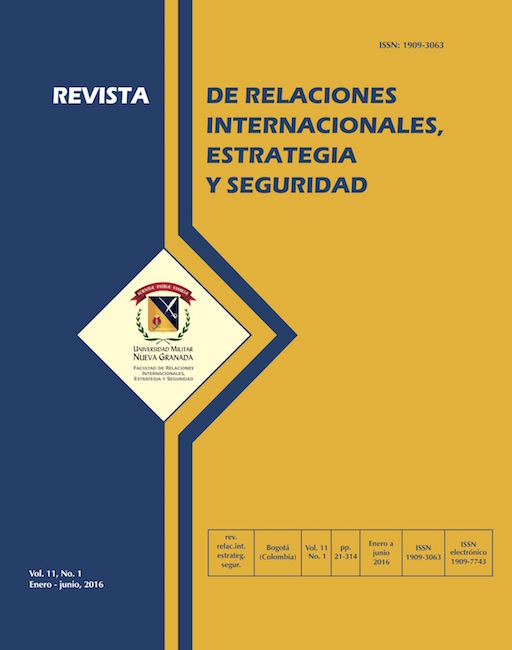Failed states? or the impossibility to constitute the modern nation-state
Abstract
There is some consensus that the existence of Failed States generates instability in the international system since they appear to facilitate the settlement of transnational criminal organizations that use their territories to develop and increase their business. However, the inclusion of many different cases in this category force a review not only of the concept but also of the idea that lays behind it, the conception of modern nation-state. Hence the objective of this paper is to discuss the scope of the concept of failed state, considering that the modern nation state has found strong difficulties for its consolidation in many parts of the world. During the research we ask ourselves if it is possible to link inseparably the State and the nation or whether they should be treated as separate concepts that are sometimes together. In the same line: Are the states the ones that fail or is the construction of the nation-state which has never materialized? What is the role of international recognition of the state in this kind of conceptualization?There is some consensus that the existence of Failed States generates instability in the international system since they appear to facilitate the settlement of transnational criminal organizations that use their territories to develop and increase their business. However, the inclusion of many different cases in this category force a review not only of the concept but also of the idea that lays behind it, the conception of modern nation-state. Hence the objective of this paper is to discuss the scope of the concept of failed state, considering that the modern nation state has found strong difficulties for its consolidation in many parts of the world. During the research we ask ourselves if it is possible to link inseparably the State and the nation or whether they should be treated as separate concepts that are sometimes together. In the same line: Are the states the ones that fail or is the construction of the nation-state which has never materialized? What is the role of international recognition of the state in this kind of conceptualization?Downloads
Languages:
esReferences
Alda, S. (2015). La debilidad del Imperio de la Ley en América Latina: un factor para entender la implantación del crimen organizado. Revista Espa-ola de Ciencia Política. 37. 63-88.
Alfonso, M. (2003). Los Estados Fallidos. Cuadernos de Estrategia. "Nuevos Riesgos para la sociedad del futuro". 120. Instituto Espa-ol de Estudios Estratégicos, Ministerio de Defensa, Madrid.
Bandieri, L. (2007) Introducción. En: Schmitt, C. Clausewitz como pensador político / El orden del mundo después de la Segunda Guerra Mundial (la Guerra Fría). Buenos Aires. Struhart & Cía.
Boege, V.; Brown, A.; Clements, K. & Nolan, A. (2008) ¿Qué es lo "Fallido"? ¿Los Estados del Sur, o la investigación y las políticas de occidente? Un estudio sobre órdenes políticos híbridos y los Estados emergentes. Madrid: Instituto Complutense de Estudios Internacionales.
Calatrava, A. & Durán, M. (2011). La compleja Construcción del Estado en el Siglo XXI: el caso de los Estados Fallidos. En: Vázquez, R. (Coord.) Teorías actuales sobre el Estado Contemporáneo, (pp. 143-165). Granada: Universidad de Granada.
Crocker, C. (2003). Hitting the right targets. Foreign Affairs.
Fieldhouse, D. (2006). Los imperios coloniales desde el siglo XVIII. México DF: Siglo XXI.
Gellner, E. (1991). Naciones y nacionalismo. Buenos Aires: Editorial Alianza.
Gutiérrez, F. (2010). ¿Estados fallidos o conceptos fallidos? La clasificación de las fallas estatales y sus problemas. Revista de Estudios Sociales. 37. 87-104.
http://dx.doi.org/10.7440/res37.2010.05
Herold, M. (2007). Afganistán como un espacio vacío. El perfecto Estado neocolonial del siglo XXI. Madrid: Editorial Foca.
Hobsbawm, E. (2012). Naciones y nacionalismo desde 1870. Barcelona: Crítica.
Martín, G. (2003). Iraq. Un fracaso de Occidente (1920-2003). Barcelona. Tusquets.
Oszlak, Ó. (1982). Reflexiones sobre la formación del Estado y la construcción de la sociedad argentina. Desarrollo Económico Revista de Ciencias Sociales. 31. 1-18. http://dx.doi.org/10.2307/3466613
Preston, P. (2006, julio 10). An imploding dust bowl, The Guardian, Recuperado de http://www.theguardian.com/commentisfree/2006/jul/10/comment.politics1
Rice, S. & Patrick, S. (2008). Index of State weakness in the developing world. Washington DC: The brookings institution.
Rosdolsky, R. (1980). Friedrich Engels y el problema de los pueblos "sin historia". México DF: Siglo XXI
Rotberg, R. (2002). Failed States in a World of Terror. Foreign Affairs. http://dx.doi.org/10.2307/20033245
Ruiz-Giménez, I. (2003). Las "buenas intenciones". Intervención humanitaria en África. Barcelona: Icaria.
Scahill, J. (2013). Guerras sucias. El mundo es un campo de batalla. Barcelona: Paidós.
Skinner, Q. (2003). El nacimiento del Estado. Buenos Aires: Gorla.
Soria, D. (1986). La guerra del Ogadén. Buenos Aires: Círculo Militar.
Waldmann, P. (2003). El Estado Anómico. Derecho, seguridad pública y vida cotidiana en América Latina. Madrid, Frankfurt: Iberoamericana.
Woodward, S. (2006). Fragile States: Exploring the concept. Madrid: FRIDE.
Zapata, J. (2014). La teoría del Estado Fallido: entre aproximaciones y disensos. Revista de Relaciones Internacionales, Estrategia y Seguridad. 9(1). 87-100.












